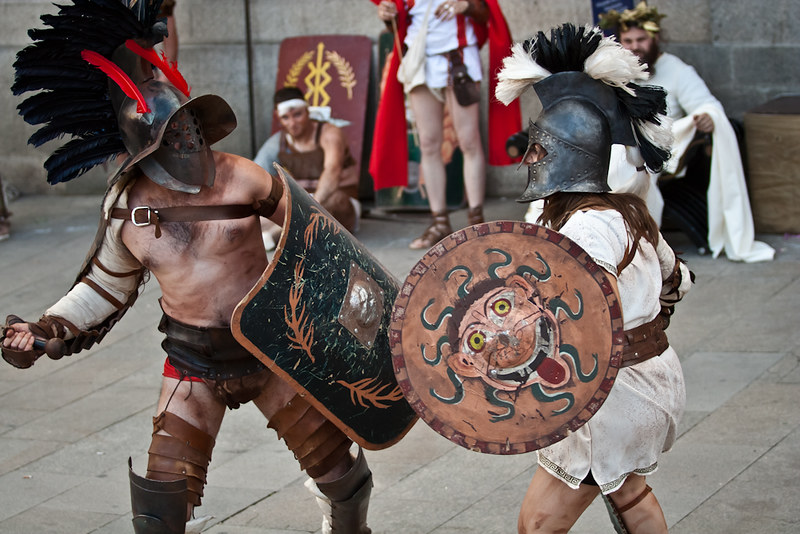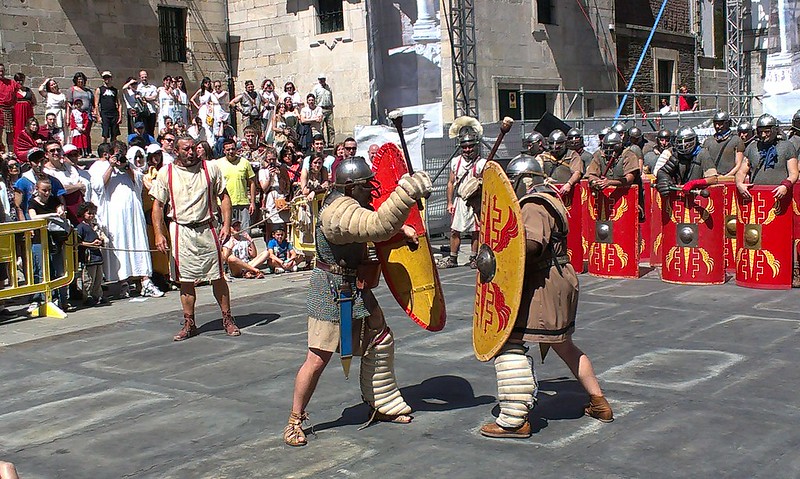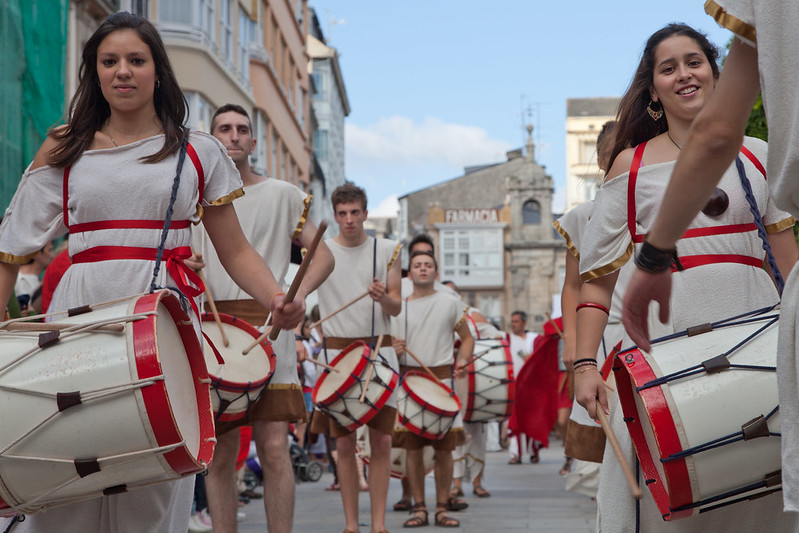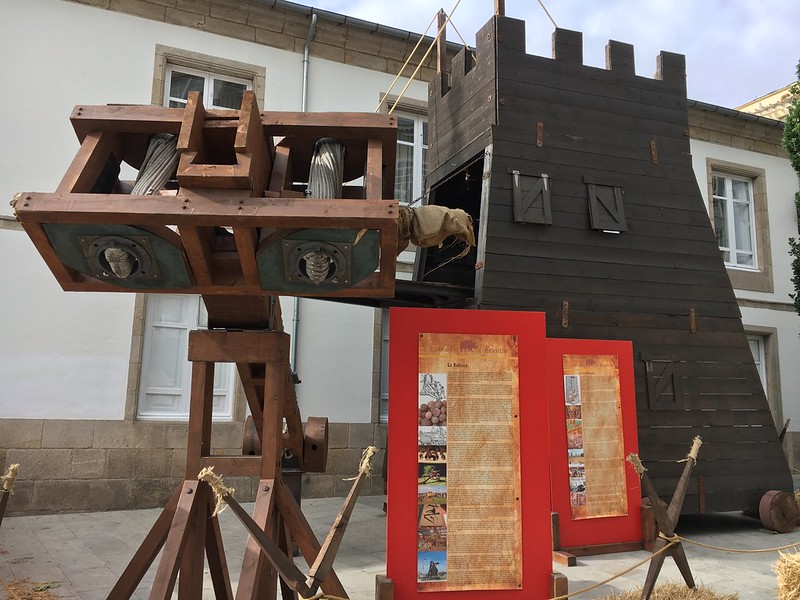Arde Lucus
The Revival of Ancient Rome in Modern Spain
2024/06/22
Every June, the city of Lugo in northwest Spain transforms into a living Roman camp. The Arde Lucus festival celebrates the ancient roots of this city, taking visitors on a time journey back to the 3rd century AD. For three days, the UNESCO World Heritage Roman walls of Lugo become the stage for a festival that attracts around 500,000 participants. History, culture, and spectacular sights blend into a unique tapestry of visuals, sounds, and scents.
Main Attractions
Military Camp: A Glimpse into Roman Life
As you approach the "Calel das Estantigas" inside Lugo's Roman walls, the smell of wood smoke and roasting meat fills the air. Here, a meticulously recreated military camp brings the past to life. Participants dressed in authentic Roman and ancient Celtic costumes engage in daily tasks, from weapon maintenance to cooking. The clanging of metal from the blacksmith's demonstrations and the chatter of "soldiers" discussing strategy immerse visitors in the daily life of ancient times.
Celtic Wedding: A Love Beyond Time
In a secluded grove near the city center, couples gather to participate in an ancient Celtic wedding ceremony. As a druid-like figure officiates, the air is filled with the sweet scent of wildflowers and burning herbs. This union, which must be renewed every year for seven years to become "eternal," offers a unique blend of romance and tradition. The soft notes of traditional Galician music provide a memorable backdrop to these intimate ceremonies.
Macellum: A Feast for the Senses
The Roman marketplace, or Macellum, is a feast of colors, sounds, and scents. Craftspeople in period costumes sell a variety of goods, from intricate jewelry to handmade leather items. The aroma of freshly baked bread, roasted chestnuts, and fragrant herbs fills the air. Street performers and musicians weave through the crowd, drawing gasps and applause from spectators. Visitors can taste Roman-inspired delicacies, such as figs drizzled with honey and savory meat pies, whose flavors tell the enduring story of ancient cuisine.
Burning of the Walls: A Grand Finale
On the final evening, thousands gather in Rosalía Park to witness the spectacular "Burning of the Walls." As workers take their positions, the air is filled with anticipation. Suddenly, the night is filled with the roar of battle cries, clashing swords, and the thunderous explosion of fireworks. This breathtaking reenactment of a siege serves as the festival's grand finale, leaving visitors in a state of exhilaration.
Cultural and historical background
The Arde Lucus festival was born in 2001, the year after Lugo’s Roman walls were registered as a UNESCO World Heritage site. What began as a small celebration has grown into one of Spain’s largest historical festivals, attracting around 500,000 visitors annually.
The festival's name, which means "Lugo Burns," reflects the city’s fiery spirit and enduring legacy. For the people of Lugo, Arde Lucus is more than just a tourist attraction; it is a living connection to their past.
The festival vividly recalls the city’s significance as Lucus Augusti, a major Roman settlement in Gallaecia. By immersing themselves in the sights, sounds, and tastes of ancient Rome and Celtic Galicia, both participants and visitors gain a deeper understanding of the cultural foundations that have shaped this region for over 2,000 years.
In 2023, the festival was declared a "Fiesta of International Tourist Interest of Spain" by the Spanish Ministry of Tourism, the highest recognition for a festival with international fame and tourist value.
Participant Voices
"I brought my 8-year-old son here for the first time. Watching the children’s eyes light up as they watched the gladiator battles in the Roman circus made me realize that we are not just dressing up; we are keeping our history alive. When an older tourist asked why we go to such lengths, I replied, 'In Lugo, history isn’t just in books; it’s in our blood.'"
"I was captivated! After deciding to join the Celtic camp, I quickly found myself grinding wheat with a stone mill and learning how to throw an atlatl. The best part was meeting a local girl named Sofia at one of the Celtic weddings."
Fun Facts
Lugo’s Roman walls, which serve as the setting for much of the Arde Lucus festival, are the only fully intact Roman city walls in the world, stretching 2.1 kilometers (1.3 miles).
During the festival, it is estimated that over 30% of Lugo’s population dresses in period costumes, creating one of the largest living history experiences in Europe.
The Celtic wedding ceremonies at the festival are so popular that some couples later make the "Celtic union" official with a legal wedding ceremony.
Festival Dates
Every June
The event schedule is subject to change. Please check the official website for the most up-to-date information.
Media
Information
| Name | Arde Lucus |
| Country | Spain |
| Area | Galicia, Lugo |
| Date | 2024/06/22 |
| Link |
Upcoming Festivals
Kukeri(Surva) Bulgaria
Bulgaria’s Festival of Spirits, Fire, and Bells That Drives Away Winter
2026/01/22Dinagyang Philippines
Iloilo’s Thunderous Festival of Faith, Tradition, and Dance
2026/01/22The Northern Lights Festival (Nordlysfestivalen) Norway
A Tromsø Miracle: Music and Aurora Dancing in the Arctic Night
2026/01/25Carnavales de Ituren y Zubieta Spain
Ancient Echoes and the Festival that Awakens Spring in the Basque Mountains
2026/01/26Up Helly Aa United Kingdom
A Night When Fire and Viking Pride Blaze in Shetland
2026/01/29Winterlude Canada
A Wonderland of Ice, Light, and Smiles in Canada’s Capital Region
2026/01/30Carnival of Viareggio (Carnevale de Viareggio) Italy
A Spectacular Parade of Giant Papier-Mâché Masterpieces
2026/01/30Fiesta de la Candelaria(Virgin of Candelaria) Peru
A Grand Dance Festival of Faith and Folklore Echoing on the Shores of Lake Titicaca
2026/01/31Thaipusam Malaysia
A Pilgrimage of Prayer and Penance Illuminates Batu Caves
2026/01/31Jaisalmer Desert Festival India
When Rajasthan’s Golden Dunes Dazzle with Color and Culture




